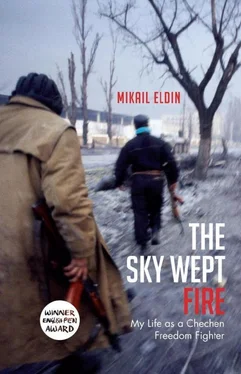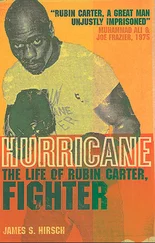I had many conversations with Angel. He was a man whose reputation remained spotless, despite all the enemy’s efforts. Even his bitterest enemies acknowledged the sincerity of his motives and his military prowess. He had made no enemies among the Chechens during all these bloody years, while continuing to be the gravest of enemies to the Russian Army, and he intrigued me. We’d known each other since the late 1980s and my interest had not faded. From my numerous conversations with him, there was one short monologue that succinctly summed up his stance towards what was happening in Chechnya.
‘If a man’s dangling over an abyss, clinging only to a branch, it doesn’t matter who saves him. All that matters is for someone to reach out his hand and pull him up. The Chechen people today are dangling over a physical and spiritual abyss and they need to be saved. It doesn’t matter who saves them – Maskhadov, Kadyrov [52] Akhmad Kadyrov, who changed sides and became President of the Moscow-appointed Chechen administration. He was the father of Ramzan Kadyrov, who succeeded him as President.
or somebody else. The enemy has come to our land and now they’re violating our most sacred concepts of honour and dignity. The enemy is like a slave who has suddenly found power over free men, and now he’s madly imposing his slave values on them, destroying the very spirit of freedom. And whoever is on the side of such an enemy cannot be the one to reach out his hand and help. If someone says, “I’ll save the people from their physical and spiritual destruction,” then I’m ready to follow him and help him. Whoever he might be. But he has to prove beyond doubt, by his actions, that his motives are pure, so the people will believe him. I’m not a politician – I’m a warrior. I don’t want to delve into all of the political intrigues, but one thing is clear to me: the Chechen people have a right and duty to live by their culture, their beliefs and national spirit. And yesterday’s slaves (it wasn’t long ago that the Russians were serfs, the chattels of their own masters) [53] In Russia, serfdom was abolished only in 1861.
cannot lord it over this land with their slave mentality. In any case, I believe in the Chechen people and in our victory. I believe that our people will survive and keep their spirituality alive, just like they’ve done so many times in history.’
As I listened to this man, I realized the secret of his strength. Why the men trusted him implicitly and why there was nothing and nobody who could dent his reputation in their eyes. He had a clear sense of his role and was fully focused on his mission, something that was true only of a select few. He was sincere not only with his friends, but with the whole world, with his enemies too. He never deluded himself or tricked others. The fighters could see this, and that was why they believed in him. And it was this – the men’s trust in him – that made him a grave enemy to the Russian Army. He was almost unknown to the world at large as he did not court attention through sensational actions. But the Russian generals who met him in battle knew him well and respected him highly.
Your mighty enemy has caught you by surprise. That enemy is hunger. You walked for a week without field rations. And then in the ravine where you stopped, you slaughtered a horse. Angel had foreseen this moment and brought more horses than were needed to transport the MANPADS. You were blessed with fog and so you were able to grill the meat on hot coals. There wasn’t much – you each got a small cube. But for hungry stomachs even that was plenty. Under these circumstances, the stomach digests foods with almost no waste. The body’s defence mechanisms take over in extreme conditions. Then you followed the river downhill, but your scouts were spotted by a Russian covert observation post as they were clearing the path of mines. Observation-post soldiers don’t generally enter into battle; their task is to detect their adversary and report back to headquarters. But your scouts also spotted them. They even observed them radioing their sighting to base. The only comfort was that they didn’t know who you were or the size of your group. They realized that you were guerrillas, of course, but didn’t know who your commander was. And so you’ve deviated from your course, climbing up a mountain that forms the left slope of a ravine. On your way out of the ravine there’s a single checkpoint. That is not too formidable an opponent; it can easily be eliminated. Especially if you attack at night, when they are more or less helpless. But your purpose is not to eliminate this checkpoint. You should not engage the enemy unless strictly necessary. Your primary concern is to reach your destination without incurring losses. What’s more, if you go into combat, it will be difficult to avoid casualties among the civilians in the nearby villages. In fact it will be impossible to avoid, because your opponents are particularly proficient at fighting peaceful civilians. And they might even deliberately fire at the villages. So you shelter on a wooded mountainside overhanging the ravine. You can only move at night. You need to sit out the day, but the enemy’s swift response means you’ll be holed up here for longer. Here two rivers meet, forming an angle, and in this angle stands your mountain. The days are fine and hot. Soon your hunger is joined by an agonizing thirst. And this is harder still to cope with. One day you are lucky: a mist settles on the mountain. You all come down the treeless slope of the mountain and begin eating the bilberries that grow here abundantly. Bilberries are rich in vitamins and they quench your thirst. But soon the fog disperses and you have to return to the shade of the forest, where no fruit grows. Meanwhile, a huge number of troops flow into the ravine. They stretch for kilometres along the narrow mountain road, packed so densely that if you’d wanted to attack them, it would be hard to imagine a more convenient target for a swift blitz of the column without suffering losses. Their advance units are already conducting a fierce battle in the ravine, using all manner of small arms and light artillery. Only they are engaging not with you, but with the traces of your presence. Traces such as the animal bones stripped of meat or a ripped rucksack discarded by somebody from the unit. Judging by the intensity of their fire, you would think they’re in a fierce, arduous battle, but watching the whole performance from above, we merely laugh at their ‘bravery’. In the four or five days while you’re biding your time to leave, they do not summon the courage to venture deeper into the forest and comb it.
You are suffering from the hunger and thirst along with everyone else. But the harder it becomes to survive, the more interest you take in the behaviour of the partisans. Here they are pulling up grass, wrapping it in a strip of bandage from their first-aid kits and squeezing it. This produces a murky green liquid. If you sweeten it liberally with saccharine, which we’re carrying due to its lightness, and if you’re desperately thirsty, you can drink this stuff. Even with the addition of saccharin, it tastes unimaginably foul, but it’s better than total dehydration. There is cast-iron discipline. A few hundred metres below the camp flows a river and we can constantly hear its tantalizing babble. But not one fighter tries to visit the river in violation of their commander’s orders.
A group of five men are calling you over. Someone pulls a single rusk out of a bag, divides it into six equal pieces and offers you one. You are as hungry as the rest. You’ve finished your field rations, which you also shared with the others. So without compunction you gratefully accept what is probably the man’s last piece of rusk. You go over to check on your colleague Roddy. He is hungry, thirsty and tired, but content. The fighters have managed to find him some berries, and the chief of staff shares his last Snickers bar with him, included in the fighters’ field rations. You chew on slender twigs plucked from the trees, which taste more or less acceptable, and they somewhat dull your hunger and thirst with the saliva produced. But the effect does not last for long. Your thirst even makes you forget the hunger. At night a group of scouts goes down to the river and they bring back a little water in flasks. Everyone receives a few sips. You cannot slaughter a horse here, either – the risk of exposure is too great. You’re interested in the morale of these men of iron, and you try to get interviews, though you always end up with a monologue instead. Despite the arduous conditions, almost all of them are filled with optimism. And this is hardly surprising. For all the men in this unit are seasoned, battle-hardened warriors, who have been through far worse with their commander. You’ll find no casual novices, seduced by the romance of war. Here every man knows why he’s here and what he’s fighting for; he is fully focused on his objective. It is this moral and psychological state that gives the men such strength and stoicism. And it is the dream of every military commander to have an army in this state. Before he set out with them on this journey, Angel subjected his men to a rigorous selection process that might have seemed extreme. He made them run for extended periods along paths that even the beasts preferred to avoid. When I enquired about the reason for such a harsh regime, he replied, ‘It’ll either break them or harden them. And anyone who breaks won’t cause us problems. Because he won’t be going with us.’ And his tactics are now beginning to bear fruit. It was only now, when the men were pushed to the brink of human endurance, that the true value of this selection process became clear.
Читать дальше












